Why the gas boiler is noisy: why the unit is buzzing, clicking, whistling, clapping + how to fight
My house is my castle, and everything should work like a clock in a castle. Agree, returning from work, we dream to relax and enjoy the comfort, and not repair the faucet, boiler or understand why the gas boiler is buzzing. However, it is extremely important to understand the causes of the problem during the manifestation of its first signs.
According to the rules for the operation of gas equipment, regular inspection and assessment of the technical condition must be carried out by gas workers. But not all brewing irregularities in their work they can identify, because Not required to visit customers daily. Therefore, it is very important to independently monitor the technique and know what to pay attention to.
In this article we will tell you what noise signals during the operation of a gas boiler, and why it whistles, buzzes, claps or clicks. Timely identification of the cause of sounds will help prevent breakdowns, extend the life of gas-consuming units, and make your life more comfortable and safe.
The content of the article:
Causes of noise in heating equipment
The new gas boiler runs virtually silently. However, over time, the unit begins to make noise.
This is a sign of hardware failure:
- scale formation;
- the fan is out of order;
- wear of the components of the apparatus;
- manufacturing defects;
- incorrect setting or installation of the boiler.
To understand why a gas boiler makes a loud noise, you need to listen to the noise that the equipment makes.
If a buzz is heard directly from the boiler, check the water level and top up if necessary. If noise is heard from radiators or piping, air has entered the system and needs to be removed. Extraneous noise in the pump itself indicates factory defects.
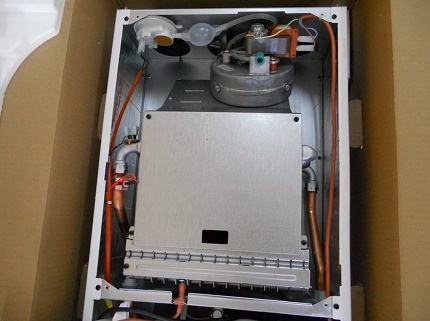
In the event of a breakdown of the circulation pump, the replacement of this element is often required. The gas supply to the system needs to be regulated from time to time. High pressure is undesirable.
Failure with a vent fan
If extraneous noise is heard at intervals, check the fan. Its task is to systematize the operation of the smoke exhaust system, due to which combustion products are removed from the boiler with the intensity necessary to ensure the full safety of those around them.
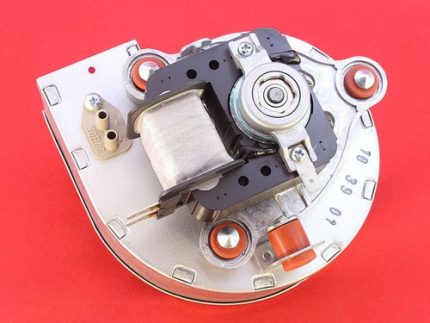
The main reason is age. Most likely, you just need to replace the fan with a new one. The second reason, which leads to rapid wear of the cooler, is its location above the burner in the upper part of the device.
Under constant exposure to high temperatures, the bearing grease dries quickly, causing it to wear out. To solve the problem, a fan replacement is also required.
Another reason for the appearance of extraneous noise effects - the part may be clogged with dust, to remove which you need to do the following:
- Inspect the fan. If necessary, it should be cleaned. The main blades are inside the housing. It is necessary to remove dirt and dust from them, and then grease the bearings.
- If the problem persists, replace the obsolete valves with brand new ball valves.
- If the previous two actions did not work, reinstall the cooler.
It is better to entrust the replacement of parts to the master of repairing gas boilers from the service with which contract signed for the maintenance of appliances and the supply of blue fuel. Timely and competently carried out replacement of worn parts will eliminate the need to buy a new unit.
Scale deposits on heat exchanger walls
Thanks to the heat exchanger, heat is redirected from gas to water. If the water is hard, then scale can form in the heating system during its heating. To remove mineral deposits deposited on the walls, it is recommended to regularly conduct a chemical flushing the heating system and cleaning the heat exchanger.
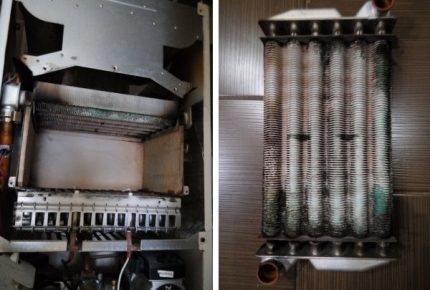
This malfunction is noticeable already after 15-20 minutes from the moment of starting the gas boiler. The reason for the appearance of sounds is the narrowing of the passage for water. As a result, steam and small bubbles form. Scale reduces the efficiency of the equipment, as well as its heat transfer and wear resistance.
Descale the machine by chemicals containing soda and the like. You can do it yourself. To do this, remove the heat exchanger, remove the casing and unfasten all connected pipes. A special chemical solution must be poured into the device for 2-5 hours.
Lack of water in the heating system
If insufficient water runs through the heating system, the boiler starts to make noise due to overheating. This is because air plugs form inside that interfere with the normal circulation of the fluid in the system.
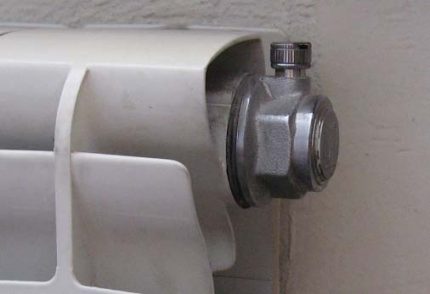
Airing leads to the following problems:
- decreases or stops the circulation of water in the coolant;
- the boiler automatically shuts off due to overheating of the coolant.
The reasons why air is in the heating system:
- violation of sealing during repair work;
- violation of the integrity of the system;
- water drainage from the DHW circuit.
To adjust the operation of the device, you need to adjust the thermostat. You also need to make sure that the thermostat is installed correctly, add water, adjust its flow and circulation.
Get rid of air in the system will help Mayevsky cranewhich is mounted in the end of the radiator. It provides a fitting, opening which you can access the inside of the battery. The crane is most often installed in the upper part of the device, where warm air accumulates.
You can also use an air separator. The device collects air that collects while circulating the water into bubbles. When the excess air is completely removed from the pipes, replenish the coolant through the make-up valve and make sure that the boiler works without extraneous sounds.
Prevent air accumulation in coolant allow the arrangement of a perfectly sealed heating system. This is troublesome and expensive, but it eliminates the occurrence of extraneous noise in a gas boiler.
Low pressure effects
Reasons why the pressure in the system may decrease:
- water leak;
- breakdown of the boiler expansion tank;
- a long break in the supply of electricity;
- incorrect setting of the gas boiler.
If pressure drops in the system, the boiler starts making loud noises. First, your task is to check for leaks in the heating circuit. A simple napkin will help you with this, which you need to wipe all the joints and joints. Having discovered the source of the leak, it must be eliminated.
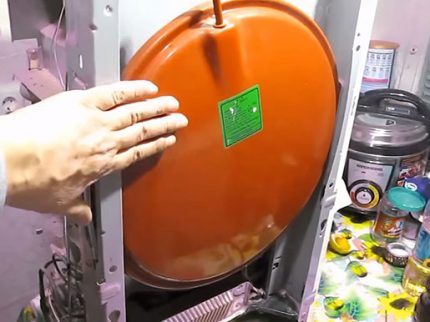
Cracks in the expansion tank or heat exchanger can cause pressure changes. To identify their location, all water should be removed from the system, and then using the compressor to pump air into it. In places of microcrack formation with a characteristic whistle, air will ooze. The appearance of microcracks indicates wear and the need for a complete replacement.
This occurs as a result of frequent flushing of the system with chemical reagents, due to poor quality metal, a sharp increase in pressure in the line, water hammer. If you can remove and repair heat exchangerthen the resulting microcracks can be soldered.
In order to prevent such problems, it is recommended to regularly audit the boiler, as well as install auxiliary equipment that will allow you to control the pressure by displaying the value on the screen. Standard pressure indicators are 1.5-2 atmospheres.
Incorrect unit setup
Incorrect setup or installation of equipment can also cause howling of the valve or bypass. Extraneous noise can occur as a result of improper load balancing.
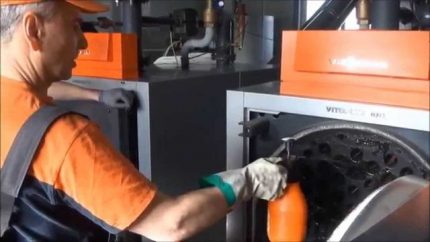
If, during heating or cooling, the sound of a metal strike on metal occurs, an uncompensated expansion of heat is generated in the device. The reason lies in improperly mounted radiator hinged brackets.
If you do not know why the gas boiler constantly whistles, you should first check the settings. The rules and sequence of actions when setting up a gas boiler can be found in the technical documentation for the unit, operating parameters - on the nameplate mounted on the equipment case.
When the boiler is turned on, popping sounds
If during the switching on of the gas boiler extraneous noises are heard: pops, clicks, knocks, you should proceed without hesitation to start searching for the problem.
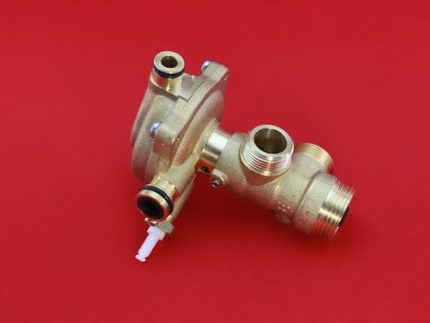
What to do if the gas boiler slams sharply when turned on:
- Faulty three-way valve. This device sends water in a small circle when taking sanitary water from taps. If it clicks, then it needs to be replaced.
- Continuous spark ignition. During ignition, the resulting excess gas flashes up and a characteristic cotton is heard. In this case, it is recommended to check the igniter, burner, electrode, as well as all contacts.
- Chimney or filter clogged. In this case, their cleaning is required. Checking the chimney is carried out by a lit match. If the flame deviates, everything is normal, if there is no draft, cleaning is required.
- Installation error. If the equipment is not installed correctly, but when heated, the metal deforms and pops. The same sound occurs when cooling, as the metal returns to its original position. When switching to the supply of hot water, the boiler buzzes. The problem is solved by reinstalling the gas boiler.
- Nozzles clogged. A thin wire is used to clean them. First turn off the gas.
If the boiler vibrates during operation, it is recommended to lay a gasket under the housing.
Causes of extraneous noise in various models
Why regularly clicks gas boiler Navien? Two reasons are likely: scale formation and problems with the coolant.
How to fix the problem yourself:
- disassemble the device;
- clean or replace the heat exchanger;
- check cranes;
- lower water temperature.
Extraneous noise is also noted during the operation of gas boilers brand Beretta.
Typical reasons:
- poor heat transfer in the heat exchanger, scale formation;
- wrong pipes connected.
Why does the Concord gas boiler whistle? The most common reason is increased stress in the cold. The boiler capacity declared by the manufacturer is not true and in practice the indicators are less.
For example, if the documentation says 13 mbar, then in reality it is 10 mbar. Do not set the operation of the device to maximum.
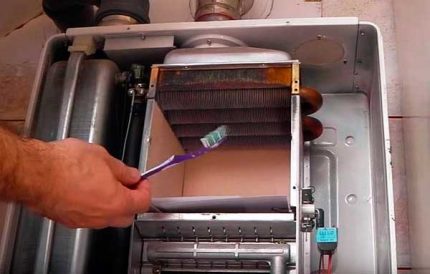
In a Baksi gas boiler, noise most often occurs when the heating function is turned on. To identify the cause, check the bypass, and also clean and adjust the valve. AOGV device users often complain about whistling. The reason is scum and a clogged filter.
Vailant boilers buzz after turning on the heating function and turning off the fire. The first reason is that the strainer in the heating circuit is clogged; cleaning it will correct the situation. The second reason is a valve malfunction on the bypass line. To solve the problem, adjust the valve.
The reason for the noise in Ariston boilers is the poor circulation of the coolant. Blowing out the heat exchanger with a compressor will solve the problem. If the gas boiler Ardelia is buzzing, check that the pump is set correctly. If the situation cannot be corrected by this method, it is recommended to replace it with a new circulation device.
Conclusions and useful video on the topic
The cause of noise during operation of the gas boiler:
Whatever gas boiler is installed in your home, first of all, make sure that it is installed correctly. Equipment needs regular routine inspection. This will allow you to identify and fix problems on time.
It is periodically recommended to clean the coolant from dirt and scale. These simple manipulations will allow the device to work as long as possible, efficiently and without extraneous noise.
Have you ever encountered a gas boiler popping, clicking, whistling, or noisy? How did you fix this problem, or what services did you contact?Share your experience with readers in the comments and ask your questions to our experts.

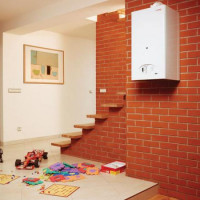 Why a gas boiler often turns on and off: the causes of malfunctions and their solutions
Why a gas boiler often turns on and off: the causes of malfunctions and their solutions 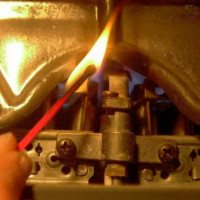 Why does the gas boiler go out? Overview of typical faults and how to solve them
Why does the gas boiler go out? Overview of typical faults and how to solve them 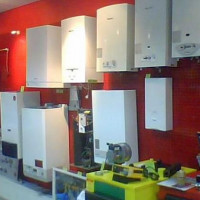 What is better double-circuit or single-circuit gas boiler: features of the device and operation
What is better double-circuit or single-circuit gas boiler: features of the device and operation 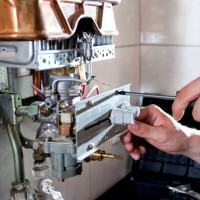 How to turn off the gas boiler for conservation: methods, detailed instructions and safety requirements
How to turn off the gas boiler for conservation: methods, detailed instructions and safety requirements 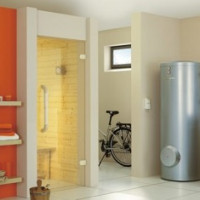 How to turn on the gas boiler: manual and useful recommendations for use
How to turn on the gas boiler: manual and useful recommendations for use 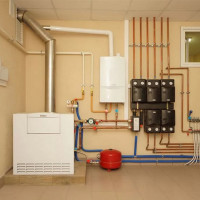 Atmospheric or turbocharged gas boiler - which is better to choose? Weighted Purchase Criteria
Atmospheric or turbocharged gas boiler - which is better to choose? Weighted Purchase Criteria 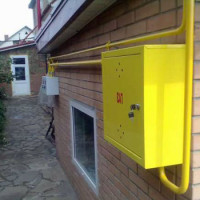 How much does it cost to connect gas to a private house: the price of organizing gas supply
How much does it cost to connect gas to a private house: the price of organizing gas supply  The best washing machines with dryer: model rating and customer tips
The best washing machines with dryer: model rating and customer tips  What is the color temperature of light and the nuances of choosing the temperature of the lamps to suit your needs
What is the color temperature of light and the nuances of choosing the temperature of the lamps to suit your needs 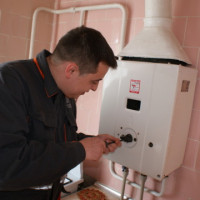 Replacement of a geyser in an apartment: replacement paperwork + basic norms and requirements
Replacement of a geyser in an apartment: replacement paperwork + basic norms and requirements